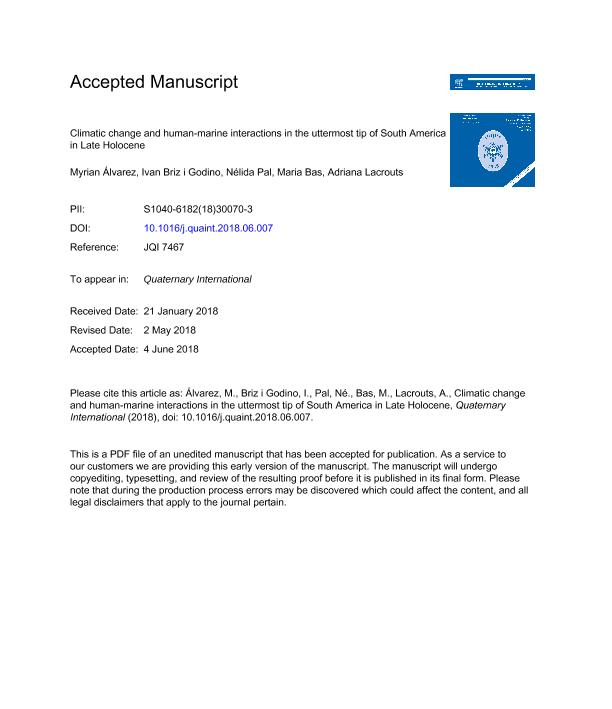Mostrar el registro sencillo del ítem
dc.contributor.author
Alvarez, Myrian Rosa

dc.contributor.author
Briz Godino, Ivan

dc.contributor.author
Pal, Nélida Marcela

dc.contributor.author
Bas López, Maria

dc.contributor.author
Lacrouts, Adriana
dc.date.available
2020-01-15T20:55:16Z
dc.date.issued
2018-06
dc.identifier.citation
Alvarez, Myrian Rosa; Briz Godino, Ivan; Pal, Nélida Marcela; Bas López, Maria; Lacrouts, Adriana; Climatic change and human-marine interactions in the uttermost tip of South America in Late Holocene; Pergamon-Elsevier Science Ltd; Quaternary International; 6-2018; 1-31
dc.identifier.issn
1040-6182
dc.identifier.uri
http://hdl.handle.net/11336/94849
dc.description.abstract
Palaeoclimatic records from southern tip of South America during the Last Holocene, indicate important climate intervals, such as the Medieval Climate Anomaly and Little Ice Age, which offered new scenarios to hunter-gatherer groups who inhabited the region. The aim of this paper is to explore the social practices carried out by hunter-fisher-gatherer societies of the southern part of the Atlantic Coast of Tierra del Fuego island (53–55°S, 66–74°W) in order to deal with these environmental changes. From our perspective, foragers have played an active role in designing strategies to cope with environmental fluctuations. Consequently, we argue that in a context of ecological uncertainty, these societies would have developed flexible strategies in terms of subsistence, technology and settlement patterns. In order to test this proposal, zooarchaeological and technological analysis of different archaeological assemblages dated between the 1300 to 220 BP were undertaken. The results show that these hunter-fisher-gatherer societies exploited a broad range of faunal resources using a versatile technology which encompassed tools with low production values and high use values. Likewise, the analysis of landscape organization revealed a settlement strategy centered on the most productive habitats, which were preferentially reoccupied. We suggest that these strategies, supported by cumulative knowledge and material conditions, could have enhanced social resilience and sustainability.
dc.format
application/pdf
dc.language.iso
eng
dc.publisher
Pergamon-Elsevier Science Ltd

dc.rights
info:eu-repo/semantics/openAccess
dc.rights.uri
https://creativecommons.org/licenses/by-nc-sa/2.5/ar/
dc.subject
CLIMATE CHANGE
dc.subject
FLEXIBLE STRATEGIES
dc.subject
HUNTER-FISHER-GATHERER SOCIETIES
dc.subject
LATE HOLOCENE
dc.subject
TIERRA DEL FUEGO
dc.subject.classification
Arqueología

dc.subject.classification
Historia y Arqueología

dc.subject.classification
HUMANIDADES

dc.title
Climatic change and human-marine interactions in the uttermost tip of South America in Late Holocene
dc.type
info:eu-repo/semantics/article
dc.type
info:ar-repo/semantics/artículo
dc.type
info:eu-repo/semantics/publishedVersion
dc.date.updated
2019-10-17T14:11:40Z
dc.journal.pagination
1-31
dc.journal.pais
Países Bajos

dc.journal.ciudad
Amsterdam
dc.description.fil
Fil: Alvarez, Myrian Rosa. Consejo Nacional de Investigaciones Científicas y Técnicas. Centro Austral de Investigaciones Científicas; Argentina
dc.description.fil
Fil: Briz Godino, Ivan. University of York; Reino Unido. Consejo Nacional de Investigaciones Científicas y Técnicas. Centro Austral de Investigaciones Científicas; Argentina
dc.description.fil
Fil: Pal, Nélida Marcela. Consejo Nacional de Investigaciones Científicas y Técnicas. Centro Austral de Investigaciones Científicas; Argentina
dc.description.fil
Fil: Bas López, Maria. Consejo Nacional de Investigaciones Científicas y Técnicas. Centro Austral de Investigaciones Científicas; Argentina. Universidad de Barcelona; España
dc.description.fil
Fil: Lacrouts, Adriana. Universidad de Buenos Aires; Argentina
dc.journal.title
Quaternary International

dc.relation.alternativeid
info:eu-repo/semantics/altIdentifier/url/https://www.sciencedirect.com/science/article/pii/S1040618218300703
dc.relation.alternativeid
info:eu-repo/semantics/altIdentifier/doi/https://doi.org/10.1016/j.quaint.2018.06.007
Archivos asociados
